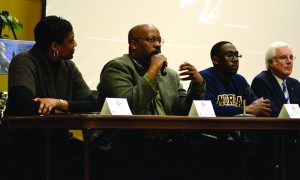
Olivia Medovich
Staff writer
In observance of Martin Luther King Jr., the office of Multicultural Affairs held a panel discussion last Wednesday to remember his legacy.
King was born Jan. 15, 1929 and dedicated his career to civil activism. On April 4, 1968 he was assassinated by James Earl Ray on the balcony of his motel room in Memphis, Tenn.
Panel members included Mayor Bill Wells, Sabrina Dial, director of equal opportunity, Brian Clardy, president of Black Faculty and Staff and assistant history professor, Ryan Hudson, president of Alpha Phi Alpha, Steven Jones, professor in the department of health and human services, Rev. Rinzee Stansberry of Mount Olivia Baptist Church in S.C. and Constance Ashby, president of black student council and vice president of Alpha Kappa Alpha.
The panel members articulated how King affected their lives and recognized how his activism is still carried on today.
Jones said in his years of teaching he has found that most students do not know much about what segregation was like.
Jones said, like King, he grew up an African-American man and spent many years of his life living segregated and shared some of those experiences in the discussion.
Jones said when he was younger he took the bus to visit relatives in Mayfield, Ky., and was forced to sit in the back even though there were other seats available in the front.
He said his aunt was a cook at a diner in a pharmacy in Mayfield and when he went to see her at work, he was not allowed to sit at the counter where she served food.
Wells said one of his favorite quotes to describe King is, “The ultimate measure of a man is not where he stands in times of comfort, but where he stands in times of challenge.”
Wells said King is admirable because his life was dedicated to others.
“Life’s most persistent and urgent question is what are you doing for others,” he said. “I admire what King did.”
He said King set an example by overcoming obstacles and being a selfless human being.
“He came from a middle class family and could have taken some easier roads,” Wells said. “It kind of reminds me of the road less taken. He did that time and time again.”
At age 35, King became the youngest man to receive the Nobel Peace Prize.
He donated the $54,123 prize money to the furtherance of the civil rights movement.
During the civil rights movement, in order to denounce segregation, King made an average of 208 speeches a year.
Dial said King should be commemorated everyday because of his everyday contributions to America.
“I wish that we could have (panel discussions) weekly so it could raise the awareness of what Dr. Martin Luther King Jr.’s message was,” Dial said.
She said the panel discussion gave participants the chance to deliberate what King’s message meant to them and gave a new perspective as to who he was.
She said people still need to be activists for civil rights today and continue to rebel against discrimination.
Contact Medovich